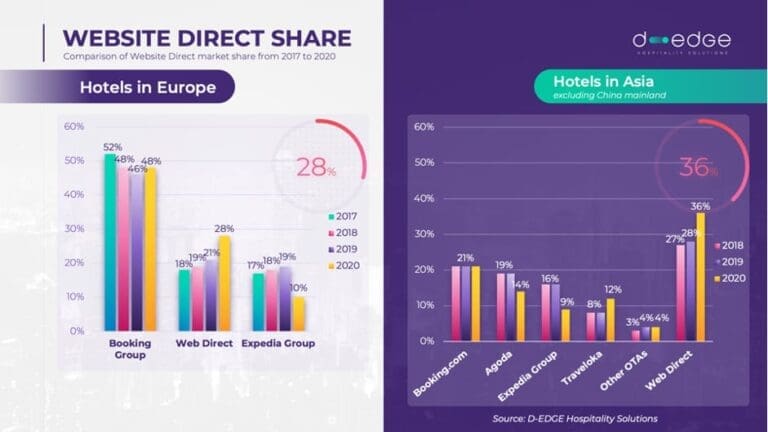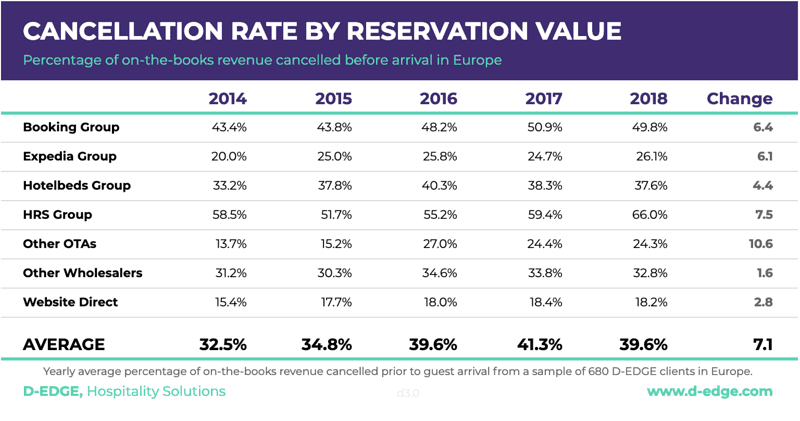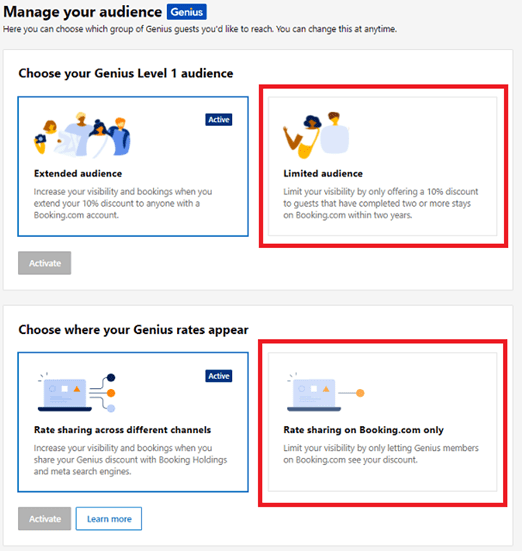[ad_1]
 With the sluggish reopening of the worldwide journey, a lot of the bigger online reserving platforms, led by Reserving.com and Expedia, have lastly determined to show their billion-dollars advertising energy engine again on. This thunderous comeback must put On-line Journey Businesses (OTAs) again within the highlight after a protracted, pandemic-induced, slumber. For the higher but additionally for the more severe.
With the sluggish reopening of the worldwide journey, a lot of the bigger online reserving platforms, led by Reserving.com and Expedia, have lastly determined to show their billion-dollars advertising energy engine again on. This thunderous comeback must put On-line Journey Businesses (OTAs) again within the highlight after a protracted, pandemic-induced, slumber. For the higher but additionally for the more severe.
Certainly, OTAs have been the topic of heated debates ever since their sector-wide adoption within the early 2010s. Whereas some accommodations see OTAs as a saving grace, praising the elevated publicity and extra bookings, different think about them to be extra of an essential evil, with issues being raised relating to the excessive fee charges and typically doubtful buyer acquisition practices. Though this age-old argument is much from being settled, the difficulty is price revisiting in gentle of the brand new post-COVID-19 journey market traits.
Prior to now few months, a number of articles and research have come out masking this topic typically from a quite subjective standpoint, to place it mildly. These papers, typically instantly backed by OTAs, have been spreading comparatively debatable content material (if not straight-up misinformation). In this article, we’ll cowl and successfully debunk 4 misguided statements relating to the state of OTAs in a post-COVID-19 journey market, from their value to their place in accommodations’ channel combine, and extra.
Assertion #1: OTAs are simply as if no more, than previous to the pandemic
Pre-coronavirus, it was regarded like nothing would have the ability to put a finish to OTAs’ rising hegemony over the net journey market. Though some accommodations tried hopping on the “Return to Direct” practice that emerged to win again a few of OTAs’ market shares, the sheer energy of Reserving.com and Expedia’s advertising methods was proving onerous to compete with. Solely an occasion of unprecedented magnitude might flip round what gave the impression to be an unstoppable tide. Enter COVID-19.
The outbreak essentially altered the relative stability of the net journey market. With OTAs reducing again their advertising price range, accommodations had the prospect to climb their approach again up travel-related search engine queries. Furthermore, Google just lately modified their promoting options for accommodations, permitting at no cost itemizing on their journey platform in addition to higher possibilities to compete with massive spenders by an improved algorithm. Lastly, as lockdowns pressured many individuals to journey inside their very own nation’s borders, reliance on giant reserving platforms decreased whereas direct bookings surged. This pattern is highlighted within the graph under kinda latest D-Edge examine.

All these components mixed put these as soon as omnipotent actors ready of relative weak spot. Concurrently, a number of articles (OTA market share more likely to improve as a result of coronavirus pandemic) went out of their option to present that the place of OTAs has remained very a lot unchanged and may fare even higher than earlier than the pandemic. For instance, this study (Examine reveals the rising significance of OTA Vacationers in Financial Restoration), unsurprisingly backed by Expedia Group, claims that accommodations will turn out to be more and more reliant on OTAs in a post-COVID-19 world. Nevertheless, the summary discloses that a lot of the surveyed vacationers had been interviewed previous to the pandemic (late 2019, to early 2020). Furthermore, the identical researchers boldly assert that “vacationers are 57 % extra more likely to guide a hotel by way of an OTA than earlier than the pandemic” principally as a result of leisure journey will probably be a giant part of the restoration course of. Though, as we noticed when crunching the numbers for each OTAs and direct reserving channel, actuality tells a really completely different story.
Assertion #2: OTAs’ prices cease on the fee, which is well worth the cash
One other study (Working with OTAs: The Oblique Distribution Dilemma) that just lately gained loads of traction analyzed the significance of counting on OTAs, particularly Reserving.com, to generate income. The primary declare was that the number of bookings generated by OTAs outweighed the price of the fee. Nevertheless, there are a number of obvious points with this analysis.
Along with being centered solely on pre-pandemic Belgian unbiased accommodations, the examination solely accounted for the financial value of working with OTAs and failed to investigate incidental penalties. As accommodations have grown to study, the worth of signing a contract with an OTA goes approaches past the fee and comes with a sway of hidden prices that do not directly weigh on accommodations’ backside line. Beneath is a non-exhaustive checklist:
- Price of cancellations: accommodations are mainly pressured to supply free cancellations in the event that they wish to rank properly on OTAs. In consequence, cancellation price is way greater on OTAs than by way of hotel website (see numbers under).
 Loss in buyer loyalty: One of many fundamental methods OTAs took over the net journey market is thru their loyalty program. Certainly, in an effort to stifle accommodation’s personal loyalty methods, most OTAs don’t share buyer information with the accommodations, even after the reserving.
Loss in buyer loyalty: One of many fundamental methods OTAs took over the net journey market is thru their loyalty program. Certainly, in an effort to stifle accommodation’s personal loyalty methods, most OTAs don’t share buyer information with the accommodations, even after the reserving.- Lowered picture management: Throughout the closed surroundings of OTAs interfaces, accommodations have drastically lowered management over their content material in addition to the visitor expertise they wish to present as in comparison with their very own website. This could translate right into a poor illustration of what your hotel is attempting to convey and a mismatch between clients’ expectations and actuality.
- Charge parity: Whereas it has been forbidden in some nations, price parity remains to be efficient in most components of the world. This clause forces accommodations to all the time disclose the most effective value obtainable on OTAs. This obligation weighs closely on accommodations pricing flexibility and talent to advertise direct bookings over third-party bookings. Particularly since this rule is a one-way avenue, with OTAs being free to supply higher charges on their platform (by reducing their fee) to seize extra gross sales.
We will additionally spotlight the inherent bias associated with the way in which the examination is set up. Certainly, By 2020, most accommodations with the price range and sources to have their very own digital technique are already current on Reserving.com. This signifies that the one accommodations left to check are almost certainly very small accommodations that principally rely on native clients and really regional or sporadic tourism. What could be extra fascinating could be to check the earnings margins of the completely different channels of sale, accounting for all prices. (together with the fee and danger management of free cancellations)
To be clear, the primary takeaway from this checklist shouldn’t be that accommodations ought to cease working with OTAs altogether. The truth is, most accommodations would nonetheless profit from the elevated publicity and additional bookings that these platforms can supply. The target of this argument was to shed light on the reverse aspect of the coin which is usually left behind when analyzing the professionals and cons of accommodations partnerships with OTAs.
Assertion #3 Utilizing online advertising to drive direct bookings is dearer than getting bookings from OTAs
One other level that’s typically raised to advertise OTAs over direct bookings is that advocating for the previous is definitely pricier than merely counting on OTAs promoting energy. For instance, in this quick article (Direct is Not At all times Finest – Lodge OTA Commissions in Comparability to the Advantages They Present), the writer claims that advertising prices to drive direct bookings could be as excessive as 15% of the worth of the sale, which isn’t a lot decrease than OTAs’ commissions when accounting for the time and sources wanted to run such campaigns.
Certainly, if this had been true, there could be precisely zero want for accommodations to spend money on any sort of digital advertising associated campaigns. Nevertheless, the numbers reported within the aforementioned article are very a lot on the upper finish of what accommodations ought to intention for when it comes to acquisition value. Different research put the numbers extra round 30/40 cents per click on and the price of acquisition closer to 5%. Moreover, even when one agrees on the 15% advertising value, producing direct bookings would nonetheless be rather more priceless than third-party reserving as it’s going to enable the hotel to develop its buyer base and finally construct buyer loyalty. Apart from that, its price reminding that the price of retention is sort of 10x lower than the cost of acquisition of a new guest.
In gentle of this, one may ask why many accommodations are nonetheless relying so closely on OTAs to generate bookings. Most likely both due to an absence of time, expertise, or all the above. Though it’s virtually assuredly not as a result of it’s too costly. As Cory Chambers, VP and chief income officer at Hospitality Ventures Administration Group place it: “relying closely on OTAs is the lazy individual’s approach out of it”. […] I simply have a look at the OTA expense, and that’s placing some huge cash on the market that you would be realizing should you did your individual direct gross sales effort”.
Assertion #4: OTAs have accommodations’ finest pursuits at coronary heart
A typical sample that we’ve been observing in all the aforementioned research is that they’re attempting onerous to color OTAs in gentle; as hotel’s finest associates, doing all the pieces to help them in a time of want. In actuality, notably due to the pandemic, OTAs made some radical adjustments to their platform, typically detrimental to accommodations.
Mirai launched a piece (What Reserving.com was doing to achieve market shares whereas we had been all in lockdown) masking the newest adjustments Reserving.com made to their platform post-COVID-19. Beneath is an abstract of the brand new “options” the platform is implementing and what they imply for accommodations:
- Push towards online cost: By shifting in the direction of a service provider mannequin, Reserving.com will have the ability to generate more money and be given extra alternatives to undercut accommodations direct charges by taking part in with their margin.
- New Most popular Plus Membership program: accommodations can determine to supply extra reductions to premium members for an additional 5% fee. This transformation implies an extra cost for accommodations that comply with this system and less visibility for these unwilling to pay the additional charge.
- “Threat Free” reservations: By default, accommodations have danger-free reservations enabled on their account. This selection provides Reserving.com the choice to reallocate your rooms to different visitors after a cancellation whereas freely altering the costs, which is more likely to outcompete your direct charges.
- World sharing of your opaque (Genius) charges: By disclosing the worth genius visitors will pay upfront to guide your hotel on Reserving.com, you undermine your direct reserving channels on aggregators.
Recognizing the menace direct bookings have to turn out to be through the COVID-19 outbreak, OTAs are actively attempting to get an edge over accommodations’ direct acquisition methods by these new “options”. The primary takeaway right here is that accommodations shouldn’t take all the pieces OTAs is pushing as genuinely useful recommendations. For instance, discover the language used within the picture under clearly selling the sharing of your genius charges and setting it by default on accommodations’ profile. Reserving.com and the likes are primarily taking care of their shoppers and backside line, all the pieces else, together with accommodations, come as an afterthought. Be sure you preserve your eyes peeled for any new adjustments applied by OTAs and all the time defend your pursuits tooth and nail.
 Parting ideas
Parting ideas
By drastically disrupting the state of the net journey market, the COVID-19 outbreak has given accommodations a novel alternative to take again management over their acquisition channels. With OTAs’ grasp over the trade weakened, direct bookings are slowly however certainly climbing up accommodations’ distribution combine. Nevertheless, OTAs have just lately come again out of the woods looking to reclaim these misplaced market shares, with little to no concern for accommodations’ pursuits.
Whereas OTAs will stay a necessary acquisition channel going ahead, hoteliers ought to try to maintain up momentum and proceed to develop their direct bookings. Though this may show tougher than merely itemizing a property on OTAs and ready for bookings to return in, the reward will probably be price it each when it comes to income and freedom of motion.
Furthermore, you aren’t alone in the battle for a return to direct bookings. A number of online options, starting from widgets to upselling instruments and customized pricing programs can assist improve conversion and convert the consumer site visitors coming from OTAs. By complementing this know-how portfolio with a strong digital advertising technique, accommodations will probably be greater than prepared to face tall subsequent to those giants of online distribution.




